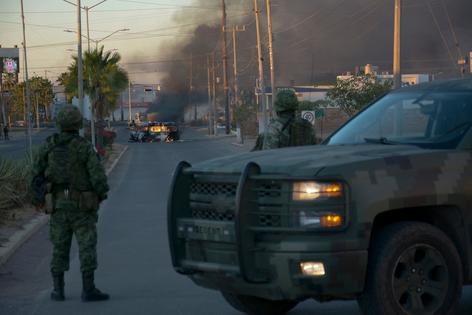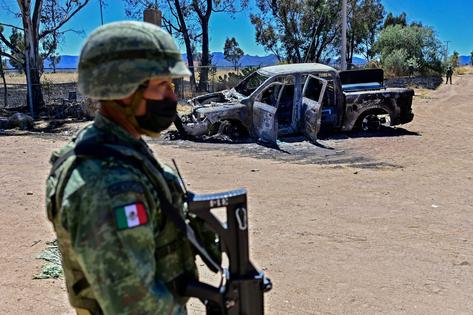Mexico made criminal justice reforms in 2008 – they haven't done much to reduce crime
Published in Political News
Mexico has waged a long, bloody battle on drugs and crime for decades. But violence there continues to soar.
In one of the latest high-profile incidents, Mexican law enforcement arrested Ovidio Guzmán-López, a leader of the powerful Sinaloa drug cartel and the son of imprisoned drug lord Joaquín “El Chapo” Guzmán, in early January 2023. The arrest sparked a wave of violence in Culiacan in northwest Mexico, resulting in looting, shootouts and 29 people killed.
The ongoing violence in parts of Mexico is largely associated with drug trafficking organizations like Sinaloa, street gangs and self-defense forces regular citizens have formed to protect themselves from crime because of ineffective police and military deterrents.
I am a scholar of Mexican culture and literature. I have written about how the Mexican government has attempted to reduce violent crime through changes to criminal justice and human rights law.
But these attempts have largely failed, allowing the cycle of violence to escalate.
Here are four key points to understand.
An average of 25 people disappear every day in Mexico. The murder rate stands at 28 per 100,000 people – four times the rate in the United States.
The violence rate in Mexico shot up starting in 2007, with the worst years in 2011 and again from 2018 to the present.
Violent crime varies significantly across the country.
The people most at risk of violence are in the central and southwestern parts of the country, as well as in the northern states of Chihuahua, Sinaloa, Baja California Norte and Tamaulipas.
In the western states of Michoacán and Guerrero, violent crime – including kidnappings, murders and disappearances – occur mostly between citizens’ self-defense and drug-trafficking groups. In the northern states, bordering the U.S., the violence is dominated by fighting between drug cartels and street gangs.
Mexican federal authorities have associated rising violence with drug trafficking since the beginning of the 20th century – dating back to 1917, when the Mexican Constitution prohibited drugs, with the goal of preventing violence.
And, so, when Mexico’s former President Felipe Calderón first declared a formal war on drugs in 2006, his decision had a long history.
The U.S. government supported this war with a US$3.4 billion military agreement, called the Merida Initiative, that began in 2007 and lapsed in 2021.
The plan’s tactics – including the Mexican military’s targeting and killing of drug cartel leaders – did not quell the rising violence, which continued to spread and intensify over the past 16 years.
Mexico has tried to address this rise in drug cartel activity and crime with different measures, including sending 128,000 Mexican soldiers to fight drug cartels and other criminal groups in Mexico’s streets – a violation of Mexico’s original Constitution that prohibited the use of military for police work within the country. In October 2022, Mexico approved a constitutional reform that allows the military to carry out domestic law enforcement through 2028.
The Mexican government also passed a number of new laws over the past decade to address crime.
One main problem with implementing these laws effectively is widespread corruption across the government, military and justice system. The Mexican military, for example, is tasked with fighting cartels – but soldiers have also been known to sell weapons to them.
In 2008, the Mexican Congress approved a series of constitutional reforms affecting the criminal justice system – these reforms addressed the reality that people often are arrested and convicted for crimes they did not commit. This is partially because Mexico’s old legal system presumed all people put on trial were guilty until proved innocent – the reforms switched this norm to the U.S. model, so people are now considered innocent until proved guilty.
Over 90% murders in Mexico from 2010 to 2016, meanwhile, remain unsolved.
The changes to the criminal justice system aim to address these issues and make several important changes. These reforms include making trials – which were typically documented only in writing – oral, making it easier for people to track court cases and leading to a rise in public monitoring of court proceedings.
The changes also mandated that three independent judges serve on all trials, to avoid the risk of a single judge aligned with drug cartels presiding over a decision.
The changes were fully implemented across all 31 states of Mexico in 2016. But these reforms have not reduced violence in Mexico. They only scratch the surface and do not address the structural issues – like misogyny and racism – at the root of violence against particularly vulnerable people, like women and Indigenous people.
Most Mexican people also do not trust their police or criminal justice system.
University of California’s San Diego’s Center for U.S.-Mexican Studies estimates that 93.3% of crimes are not reported. Out of the small number of reported cases, arrests are made in only 11.5%.
Women, notoriously, are not acknowledged when they report that they are victims of crime, or they are reported missing by loved ones. And violent crimes against women are solved at even lower rates than other crimes.
In my opinion, criminal justice reforms alone cannot reduce crime in Mexico.
The percentage of Mexican people living in poverty continued to grow from 2018 and 2020, increasing by 7.3% during these years.
Inequality between Mexico’s richest and poorest people also remains on the rise, making it one of the most unequal countries in the world. Some research shows that strengthening educational systems in Mexico – and reducing inequality – could help curb crime.
These factors – in addition to illicit drug usage in the U.S. and demand for drugs transported through Mexico – all form a complicated web that will need to be untangled, and systematically addressed, before criminal justice reforms alone can help make Mexico a safer and more just country.
This article is republished from The Conversation, an independent nonprofit news site dedicated to sharing ideas from academic experts. The Conversation is trustworthy news from experts, from an independent nonprofit. Try our free newsletters.
Read more:
Cartel kingpin El Chapo is jailed for life, but the US-Mexico drug trade is booming
Mexico, facing its third COVID-19 wave, shows the dangers of weak federal coordination
Rebecca Janzen received funding from the University of South Carolina's College of Arts and Sciences to conduct research for this work.




























































Comments